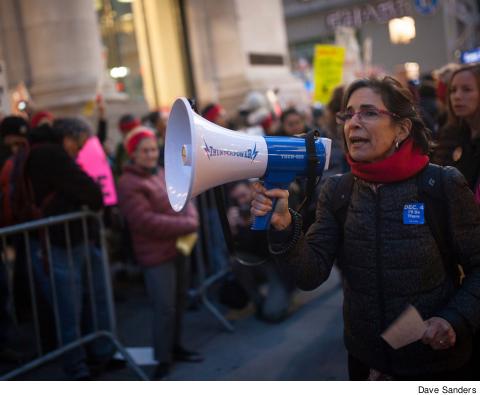A HEO from a CUNY family
 |
Growing up in a union household in Brooklyn, Andrea Vásquez, the recently elected PSC first vice president, is no stranger to unions. Her father, a typesetter, was a member, a delegate and a grievance counselor for the International Typographical Union, and her mother was involved with unions and progressive causes.
Vásquez became involved with the PSC while working at the Graduate Center’s American Social History Project, and she has moved from alternate delegate to delegate, and from bargaining committee member to chair of the Higher Education Officer (HEO) chapter. This spring, she became the PSC’s first vice president, replacing Mike Fabricant.
“I’m really excited to work alongside the other principal officers and member leaders in order to confront our current challenges,” Vásquez said.
CRITICAL TIMES
Vásquez assumes her role as first vice president at a critical moment for the labor movement. By the end of June, the Supreme Court is expected to rule, in the case Janus v AFSCME, in favor of making the collection of agency fees by public sector unions unconstitutional. As this newspaper went to press, a final ruling by the Supreme Court was still pending.
Vásquez joins three other women who are PSC’s principal officers. While the PSC has a long tradition of female leadership, it is the first time all four principal officers are women, and Vásquez is the second HEO to assume a principal officer position since 2000.
It was strong female union members, HEOs at the Graduate Center, who originally inspired her to get involved with the PSC.
MEMBERSHIP OUTREACH
“They taught me about the major issues facing HEOs. They taught me about the limits of promotion and its significance in their work lives,” Vásquez said. “Many worked in the same department, same title for 20 years. They were just outraged and appalled that they could not get promoted.”
As a member of the bargaining committee, Vásquez was proud of breakthroughs in the latest contract, which created opportunities for the financial advancement of her fellow HEOs. As HEO chapter chair, she, along with other HEO leaders, established nearly two dozen labor-management committees, one at each college, to review applications for differentials according to the new provisions in the PSC-CUNY contract that allow for HEO advancement.
Identifying leaders in the HEO chapter and getting workers more involved with union work is also a goal for Vásquez. For the past year, she has been signing up workers as full, dues-paying union members.
“People need to make a conscious decision [about joining the union]. This is not something that they can be passive about,” Vásquez told Clarion. “Many of our rights and benefits could be undermined or lost, so it is important for us to stay active and stay members.”
LOOKING AHEAD
Committing to the union involves a lot of one-on-one and follow-up conversations, she said. It’s routine and, oftentimes, unglamorous work, but it’s necessary to build a powerful union.
“The hardest part of organizing is moving people from step to step,” Vásquez said. “You listen, get to know people and build independent areas of activity.”
Under her leadership, the HEO chapter has reached 95 percent membership. As HEO chapter chair, she has visited every campus, talked to every constituency and also knows the concerns of other titles. One advance that she would like to see in this round of bargaining is increased salary schedules for staff in CLT titles. She is committed to the union’s coalition work, especially at a time when ordinary people are facing pressing concerns around healthcare, education, housing and immigration. As first vice president, she plans to be active in progressive initiatives in the state and city that would better the lives of union members, CUNY students and the larger New York City community.
Solidarity is nothing new to Vásquez, who grew up going to rallies and supporting workers, including her father, on the picket lines. A Hunter College graduate herself, Vásquez comes from a CUNY family. Two of her children went to CUNY colleges. Her husband, Gerald Markowitz, is a PSC member and a distinguished professor of history at John Jay College of Criminal Justice. Her father attended Brooklyn College and City College and her mother studied at John Jay.
Commitment to CUNY and activism are reflected in the CUNY Digital History Archive, one of her recent projects at the Graduate Center, where she is an associate director of the American Social History Project and a managing director of the New Media Lab. The archive preserves and presents documents related to CUNY’s history, as experienced by students, faculty, staff and community members.
As a student of history, Vásquez learns from the past and lets it inform her current work. “Unions are only as strong as their organized membership,” she said. “More power comes from the involvement of more and more members.”

